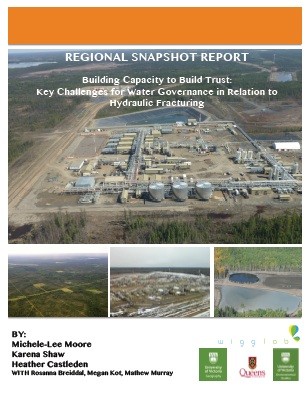Our Publications
Our publications page is where you can dig deeper into the research that has been done by the WIGGLAB. Browse the selection below or do a search through our database.
Reports, Workshop Proceedings and Upcoming Events
-

Building Capacity to Build Trust: Key Challenges in Water Governance in Relation to Hydraulic Fracturing Report and Decision-Makers Brief
The use of water in hydraulic fracturing activity in Canada has not caused, but has certainly illuminated, the fractured nature of existing water governance arrangements. This report identifies the key water governance challenges specific to hydraulic fracturing across Canada (with a particular focus on British Columbia, New Brunswick, the Northwest Territories, and Nova Scotia) and the knowledge gaps that need to be addressed to resolve such challenges. We present the challenges in four major themes:
- Theme 1: Capacity, transparency and accountability of regulators
- Theme 2: Scientific uncertainty regarding risks and cumulative effects
- Theme 3: Inclusion of Indigenous nations in water allocation decisions
- Theme 4: Community concern and sense of place.
The report closes by providing general research proposals that would close such knowledge gaps.
Citation: Moore, M-L, Shaw, K., Castleden, H. with Breiddal, R., Kot, M, and M. Murray. Building capacity to build trust: Key challenges for water governance in relation to hydraulic fracturing. Regional Snapshot Report prepared for: Canadian Water Network, Waterloo, ON.
-
Resilience Analysis in a Canadian Watershed Context
This briefing note draws on lessons learned from two resilience analysis workshops that were held in watersheds in New Brunswick and British Columbia in 2014. It provides a concise explanation of what resilience means in a watershed context and uses the workshop activities to demonstrate key concepts. It also describes the potential for using resilience concepts in watershed management and planning.
Citation: Plummer, R., Baird, J., Krievans, K., Brandes, O., and M-L. Moore. 2014. Resilience Analysis in a Canadian Watershed Context. Briefing Report prepared for: POLIS Water Sustainability Project.
-
UPCOMING RELEASE
Scaling out, Scaling up, and Scaling Deep: Lessons on Scaling Social Innovation and Designing the Learning Processes to Support it
Leaders of social change and innovation often struggle to expand their impact on social systems, and funders of such change are increasingly concerned with the scale and positive impact of their investments. This report examines lessons learned by practitioners, one decade after participating in a peer-learning initiative led by the McConnell Foundation to accelerate the impact of social change initiatives. Part one of this report distills important lessons from a decade of practice in accelerating impact and scaling social innovations, including the strategies used to achieve success. Part two summarizes insights from this cohort of social innovators about the design elements involved in the applied, peer-based learning process and how that ultimately built their personal and organizational capacity.
Citation: Riddell, D. and M-L. Moore. 2014. Scaling out, Scaling up, and Scaling deep: Lessons on Scaling Social Innovation and Designing the Learning Processes to Support it. Report prepared for: J.W. McConnell Family Foundation and Tamarack Institute. Montreal, QC: McConnell Foundation
-
The Cowichan Watershed Board: An Evolution of Collaborative Watershed Governance
This report is the first in a series that explores examples of watershed governance in action. The series explores how governance can evolve over time, and offers an understanding of specific successes, challenges, and barriers. This case study was inspired, in part, by the ongoing relationship between the Cowichan Watershed Board and the WSP. It offers a glimpse of the good work being done in the Cowichan watershed as the people there continue their efforts to build local trust, engage in genuine collaborative efforts to improve watershed management, and protect and enhance their home waters.
Citation: Hunter, R. with Brandes, O., Moore, M-L., and L. Brandes. 2014. The Cowichan Watershed Board: An Evolution of Collaborative Watershed Governance. Prepared for: Watershed Governance Case Study Series. Victoria, BC: POLIS Water Sustainability Project.
-
Thinking Like a Watershed – Water Canada Magazine article
For its July/August 2014 issue, Water Canada magazine published an article co-authored by the WSP’s Laura Brandes, Oliver M. Brandes, and Michele-Lee Moore. It outlines the growing interest in and need for collaborative watershed governance, using the Watersheds 2014 forum and WSP report A Blueprint for Watershed Governance as examples of early steps toward reshaping our socio-ecological governance framework.
Citation: Brandes, L., Brandes, O., and M-L. Moore. 2014. Thinking like a watershed. Water Canada, July/August: 28-29.
